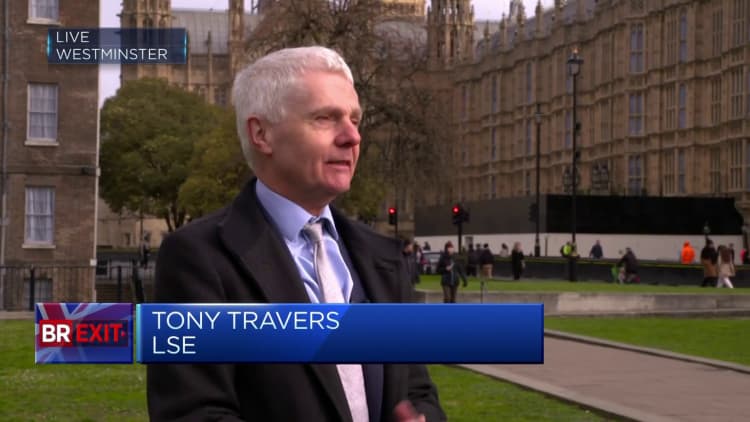LONDON — The new Brexit deal between the U.K. and the EU may help bring Britain's "healthy fundamentals" back to the fore, providing relations with Brussels continue to improve, analysts suggest.
U.K. Prime Minister Rishi Sunak and European Commission President Ursula von der Leyen on Monday announced the agreement of the Windsor Framework, which aims to fix the controversial Northern Ireland Protocol.
The Protocol had been a long-standing bugbear for unionist pro-Brexit parties in Northern Ireland, and had brought the devolved Northern Ireland Assembly to a standstill over the past year, after the Democratic Unionist Party resigned in protest.
Though expected to pass through the British parliament, the agreement has been met with mixed messages from Belfast, with the DUP currently examining the details of the deal against the "seven tests" it has insisted upon.
Tony Travers, professor at the London School of Economics and Political Science, told CNBC on Monday that while the DUP could still make things difficult for Sunak, the prime minister's more amiable approach to Brussels provides a "platform for the U.K. and the EU to create a more rational relationship."

Berenberg Senior Economist Kallum Pickering said in a note Monday that the breakthrough could mark a "line in the sand" after six-and-a-half years of damaging uncertainty.
The new accord potentially removes the threat of a tit-for-tat trade war between the U.K. and its biggest market, which had been an ever-present threat under the more combative approaches of Sunak's predecessors Boris Johnson and Liz Truss.
Pickering said this would improve confidence and likely unlock business investment that had been held on the sidelines by the risk of a U.K.-EU trade dispute.
"While the U.K. will suffer a lasting impact on its growth potential following its decision to increase the barriers of trade with the EU, the major factor holding the U.K. economy back since the referendum has been uncertainty," he explained.
"If this comes to an end, we expect the U.K.'s healthy fundamentals — well capitalised banks, cash flush households and firms, and well-regulated markets — to re-assert themselves."

Berenberg retains above-consensus GDP projections for the U.K. over the next three years, seeing a 0.8% contraction in 2023, followed by a 1.6% rebound in 2024 and further growth of 1.7% in 2025.
The U.K. GDP contracted by 0.5% in December, as the economy flatlined over the final quarter of 2022 to narrowly avoid a technical recession, but the soaring cost of living and monetary policy tightening create persistent headwinds to growth. The Bank of England projects that the economy entered a shallow five-quarter recession in the first quarter of 2023.
Several years ago, such a Brexit deal would have had a substantial impact on markets. Sterling picked up slightly following the announcement, but the overall reaction in stock and currency markets was relatively muted by historical standards.
Jordan Rochester, senior G10 FX strategist at Nomura, said that, despite its political significance, the deal would not immediately filter through to the market's pricing of the U.K.'s overall trading relationship with the EU, and that traders currently have other priorities.
"This is very much a Northern Ireland issue, Northern Ireland with one of the smallest populations of the regions in the U.K., with the smallest GDP as well, won't materially change many people's macroeconomic forecasts for where growth for the U.K. will be, where inflation will be, and what this means for the Bank of England," he said.
He suggested that the accord could begin to have a greater long-term market impact, if a sea change occurs towards "more pragmatic politics" with the EU, which could open the door to further incremental improvements to trading arrangements.

